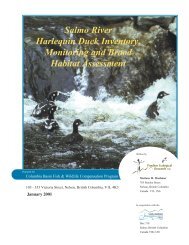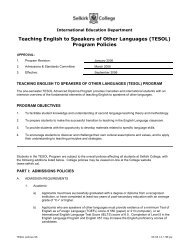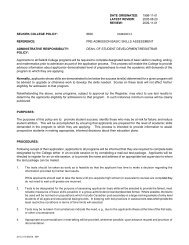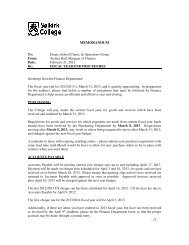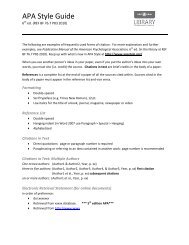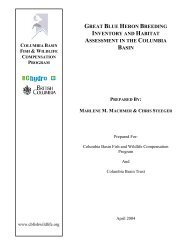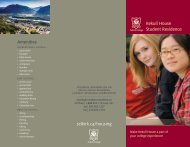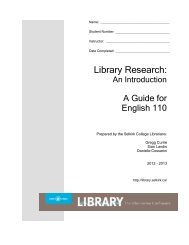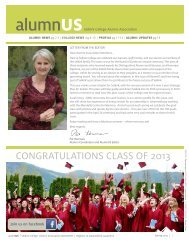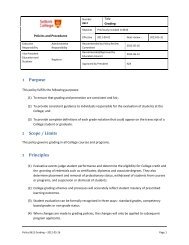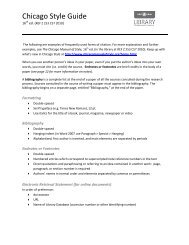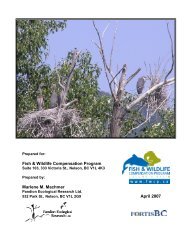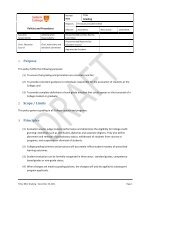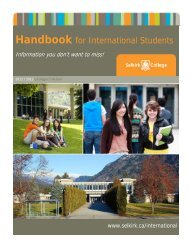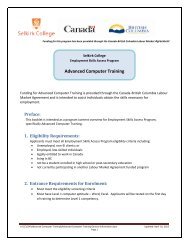selk irk.ca - Selkirk College
selk irk.ca - Selkirk College
selk irk.ca - Selkirk College
You also want an ePaper? Increase the reach of your titles
YUMPU automatically turns print PDFs into web optimized ePapers that Google loves.
Music and technology, contemporary (performance)<br />
will be required to assume a leadership role within<br />
their ensemble. Upon successful completion, they<br />
will have increased their performance abilities in<br />
the areas of versatility, sound, sight-reading, and<br />
improvisation. Students will be able to function in<br />
a variety of professional engagements common to<br />
today’s music industry.<br />
Prerequisites<br />
Must be a full-time Performance Major.<br />
MUSC 264 Instrumental Lab III<br />
This course is designed to help students develop<br />
instrumental skills. Grouped by instrument,<br />
students learn the fundamentals of reading,<br />
articulation, balance, dynamics, styles and<br />
technique as related to their particular instrument.<br />
This course is taught “instrument-in-hand” and<br />
also uses audio and visual aids to explore different<br />
techniques and styles. A requirement in all majors,<br />
students have weekly assignments.<br />
Prerequisites<br />
MUSC 163.<br />
MUSC 268 Songwriting I<br />
This course is designed to help you prepare for<br />
survival in the competitive world of the songwriters<br />
market. Learn about all types of styles while striving<br />
to define your own. Special attention is paid to the<br />
rudiments of songwriting: creativity, basic theory<br />
(usage of basic rhythms, s<strong>ca</strong>les, harmony, melodic<br />
patterns, lyrics, etc.), basic styles (pop. rock, folk,<br />
country, etc.), production patterns, and the legalities<br />
of the music business. The class also spends<br />
time analyzing the work of other writers (successful<br />
and unsuccessful; those who have maintained<br />
artistic integrity; those who have not).<br />
Prerequisites<br />
A “B” or better in MUSC 171 and MUSC 175,<br />
and/or permission of the instructor.<br />
MUSC 272 Improvisation I<br />
In this course students will begin applying the<br />
basic tools of melodic improvisation. Through<br />
performance and analysis, melodic interpretation,<br />
phrasing, rhythmic density, motivic development,<br />
pacing, voice leading, and harmonic accuracy will<br />
be explored. The class will examine classic solos in<br />
a variety of idioms. Students will be required to<br />
write and transcribe solos. The class is taught with<br />
“instrument in hand.”<br />
Prerequisites<br />
MUSC 151 (with a “B” or better), MUSC 163,<br />
175, and 181 for MUSC 272. Students must be<br />
full-time Performance Majors.<br />
MUSC 274 Contemporary Harmony III<br />
This course continues with the principles of<br />
contemporary harmony as presented in CH II.<br />
Topics are expanded to include advanced minor<br />
key concepts, introduction to modal harmony and<br />
modal interchange, substitute dominant functions,<br />
basic chord s<strong>ca</strong>les for melodic considerations,<br />
advanced harmonic analysis and basic concepts of<br />
re-harmonization. This course provides students<br />
with a working knowledge of contemporary minor<br />
key and modal harmony and the ability to use<br />
them in all styles of popular music.<br />
Prerequisites<br />
MUSC 175.<br />
MUSC 280 Ear Training III<br />
This course continues to develop an aural<br />
perception of intervals, pitches, seventh chords,<br />
chord progressions, melodies and rhythms. The<br />
focus of this Semester is on minor and secondary<br />
dominant melodies and chord progressions.<br />
The rhythms explore sixteenth note syncopated<br />
rhythms as well as 6/8 and 5/4 meters.<br />
Prerequisites<br />
MUSC 181.<br />
MUSC 282 Film Scoring I<br />
This hands-on course focuses on TV and radio<br />
broad<strong>ca</strong>sting. Students are required to score<br />
themes and cues for various TV and radio shows<br />
using mostly electronic equipment along with one<br />
or two live musicians.<br />
Prerequisites<br />
MUSC 171; and/or permission of instructor.<br />
MUSC 288 Advanced MIDI<br />
Appli<strong>ca</strong>tions I<br />
This course is an applied study of the software<br />
and concepts used in the recording home studio<br />
environment. The primary focus of the course is<br />
in the use of Pro Tools LE for the self-recording<br />
musician. Topics include: mixing console appli<strong>ca</strong>tion,<br />
editing techniques, microphone technique,<br />
an introduction to effects processing for final<br />
mixing, auxiliary buss in the virtual mixing<br />
board, use of patch bay, outboard effects, and file<br />
maintenance.<br />
Prerequisites<br />
MUSC 161 with a “B” or better.<br />
TWC 266 Introduction to Techni<strong>ca</strong>l<br />
Writing and Communi<strong>ca</strong>tions<br />
A review of basic English skills with an introduction<br />
to general principles in written techni<strong>ca</strong>l<br />
communi<strong>ca</strong>tion and its appli<strong>ca</strong>tion to professional<br />
music. Classroom sessions focus on grammar,<br />
writing skills, oral presentation skills, and job<br />
search techniques.<br />
MUSC 100 MUSIC FORUM<br />
Music Forum is a course designed to provide an<br />
opportunity for all music students and faculty to<br />
share in a weekly edu<strong>ca</strong>tional experience. Each forum<br />
will have a different musi<strong>ca</strong>l focus. Students<br />
will have opportunities to perform, witness perfor-<br />
mances by faculty and guest artists, as well as gain<br />
insights into the industry from guest lecturers and<br />
music professionals. Forum will also provide an<br />
opportunity for the presentation of collaborative<br />
audio-visual projects between departments.<br />
Prerequisites<br />
None. Attendance is mandatory for all music<br />
students.<br />
MUSC 251b Directed<br />
Studies/Mentorship<br />
A bi-monthly (every other week) 1/2 hour private<br />
tutorship is provided for all Directed Studies<br />
majors. Students will consult with their mentor<br />
on a consistent basis (for a total of six meetings<br />
per semester). Instruction is designed to increase<br />
student’s techni<strong>ca</strong>l, artistic, and musi<strong>ca</strong>l quality<br />
relating to final project goals, as pertaining to<br />
student’s project proposal and portfolio. The<br />
mentor may be changed, pending approval, on a<br />
semester basis.<br />
Prerequisites<br />
MUSC 250b, and must be enrolled in the<br />
Directed Studies Major.<br />
MUSC 257 Contemporary<br />
Music Analysis II<br />
This course will focus on the delivery of each student’s<br />
show<strong>ca</strong>se where a high level of performance<br />
and leadership will be developed. Other elements<br />
such as stage presence, promotion, and techni<strong>ca</strong>l<br />
support will also be addressed. All show<strong>ca</strong>ses will<br />
be recorded and videotaped for future use in demo<br />
packages.<br />
Prerequisites<br />
MUSC 256; and must be a full-time Performance<br />
or Songwriting Major.<br />
MUSC 259 Preceptorship II<br />
Students continue their immersion in a professional<br />
performing environment where they receive<br />
feedback not only from their instructor, but also<br />
from club owners, managers, and customers. In<br />
this class, students will e required to assume a<br />
leadership role within their ensemble. Upon successful<br />
completion, they will have increased their<br />
performance abilities in the areas of versatility,<br />
sound, sight-reading, and improvisation. Students<br />
will be able to function in a variety of professional<br />
engagements common to today’s music industry.<br />
Prerequisites<br />
MUSC 258Q.<br />
MUSC 262 Survey of<br />
Recording Techniques<br />
An introduction to recording principles and<br />
practices, this course is open to students whose<br />
major is not music production. Topics include a<br />
brief history of the multi-track recording studio,<br />
procedures of a recording studio, procedures of a<br />
recording session, fundamentals of microphones<br />
and audio effects.<br />
School of Digital Media and Music<br />
Selk<strong>irk</strong> <strong>College</strong> 12/13<br />
69



